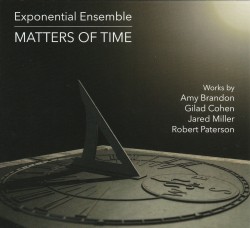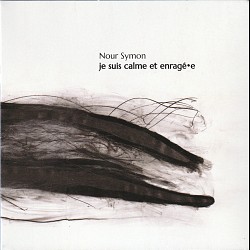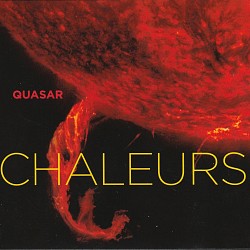 Matters of Time
Matters of Time
Exponential Ensemble
American Modern Recordings AMR1055 (americanmodernrecordings.com)
Listen
The Bright Exuberant Silence: III. In Slow Motion - Listen on Spotify
Crown of the Sun - Listen on Spotify
Relative Theory: III. Einstein's Daydream - Listen on Spotify
Read the Review
Founded in 2011 by clarinetist Pascal Archer, Exponential Ensemble is a mixed chamber music collective (flute, clarinet, oboe, bassoon, violin, viola, cello and piano, supplemented with horn, trumpet and an additional violin here), whose unusual mission includes commissioning and premiering works that are inspired by math, science and literacy. Matters of Time (American Modern Recordings AMR1055 americanmodernrecordings.com) features four quite different works that approach this mandate in varying ways. Amy Brandon says “Crown of the Sun is a reflection on the physical nature of the sun’s corona contrasted with the deep emptiness of space. NASA recently sonified the radiation patterns that the sun emits, and I found a particular connection between this sound and the complex and beautiful sound of oboe multiphonics, which is why they are referenced throughout this piece, to essentially sonify the varying states of the sun’s corona in sound.” A Dark Matter by Gilead Cohen “explores the notion that our mind also sometimes circles around an […] indefinable worry, regret, or fear [that] can occupy us for a long time and color everything else in dark shades. At the core of this piece is such musical ‘dark matter.’” The Bright Exuberant Silence by Jared Miller gives us a curiously positive glimpse at the lockdowns of 2020, inspired by that “fleeting and eerie moment in modern history when the world was put on pause due to COVID-19 [and] nature began to heal. Pollution started to clear in the air as fewer people drove cars to work every day. Birdsong was audible in silent metropolises [and] you could even see the stars in the sky in the middle of Manhattan on some nights. Nature began to overtake cities quietly and holistically – and for a moment, urban dwellers learned what it was like to peacefully coexist with the natural world.” Both Miller’s and Brandon’s work were commissioned with the support of the Canada Council. The disc is completed by a surprisingly lyrical, playful and somewhat anachronistic work, to my ear reminiscent of the music of Francis Poulenc, by Robert Paterson. Relative Theory is in four movements that reference physicists and mathematicians Blaise Pascal, Emmy Noether, Albert Einstein and Pythagoras. Paterson says he was inspired by how much the Exponential Ensemble enjoy performing programs for children that relate math to music. “In a fun, yet hopefully meaningful way, the movements of my piece are designed to draw parallels between these two distinct, but interrelated worlds.” It certainly is fun, especially Einstein’s Daydream with its quotations from Bach, Beethoven and Mozart, and the rollicking finale The Hammers of Pythagoras.





















